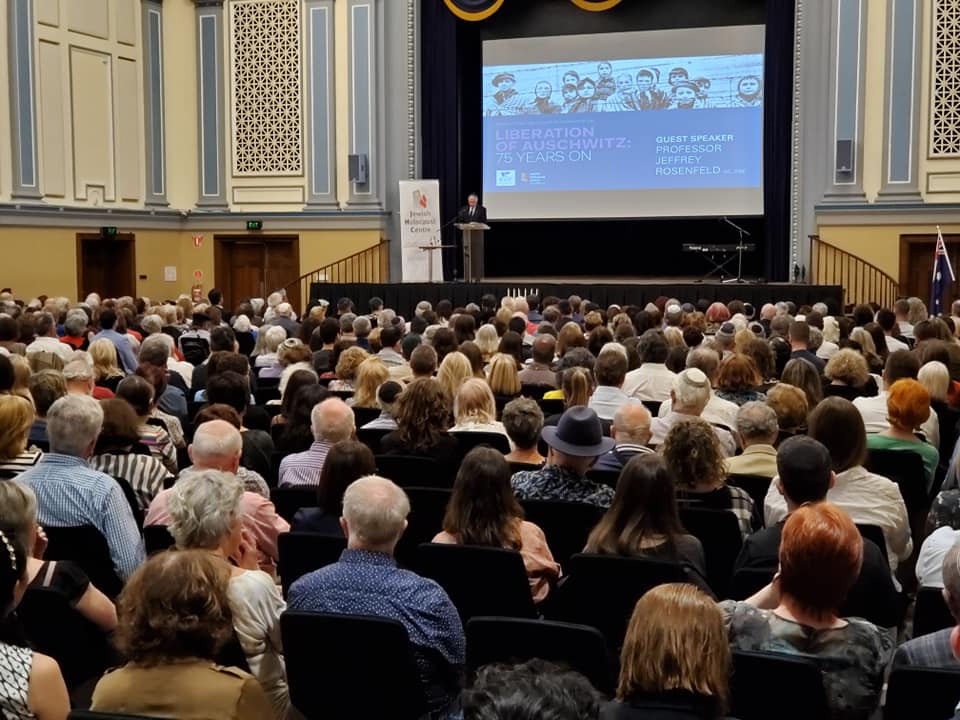
Today, January 27th, is Holocaust Memorial Day. 75 years ago on this day the Auschwitz concentration camp was liberated. The camp carried out the industrialised the killing of human beings on a grand scale.
As the United States Holocaust Memorial Museum explains, “It is estimated that the SS and police deported at least 1.3 million people to the Auschwitz camp complex between 1940 and 1945. Of these deportees, approximately 1.1 million people were murdered.” Of those who were killed, 960,000 were Jews, 74,000 were Non-Jewish Poles, 21,000 were Roma, 15,000 were Soviet prisoners of war and 10,000 to 15,000 were from other countries.
The Smithsonian Magazine has a short video about Auschwitz which is worth watching for some background on this 75th anniversary.
A major commemoration will take place at Auschwitz. Australia will be represented by the President of the Senate, The Hon. Senator Scott Ryan. Details are available of the event and the live stream which will start at 1:30am on January 28th AEDT.
Commemoration events were also held in Melbourne and Sydney. We’ve live streamed key parts of the Melbourne event including:
- The opening address by Sue Hampel, Co-President of the Jewish Holocaust Centre in Melbourne and a member of Australia’s delegation to the International Holocaust Remembrance Alliance.
- Holocaust survivor Eva Slonim OAM shared her testimony including her first hand account of the liberation of Auschwitz.
- Prof. Jeffrey Rosenfeld AC OBE delivered the keynote address. He shared his first hand account of witnessing genocide after the Holocaust, having served as a military surgeon with the UN Assistance Mission in Rwanda (UNAMIR II) in 1996.
- In the candle lighting ceremony six memorial candles were lit in memory of the 6 million Jews who were killed by the Nazis, the other victims of the Nazis and the victims of other genocides. The candles were lit by Paul Grinwald, Rebecca Forgasz, Frida Umuhoza, Cheryl Plaut, Hinde Ena Burstin and Anita Kaminski.
- The event’s closing remarks came from Jennifer Huppert, President of the Jewish Community Council of Victoria.
We also launched our campaign tackling online Holocaust denial, distortion and glorification. This campaign, starting on Holocaust Memorial Day, will run until the end of February. It will connect with some of our work representing Australia in the International Holocaust Memorial Alliance, where we are helping international efforts in this space. The campaign will be followed by other month long campaigns throughout 2020, each focused on a different form of online hate.
On Holocaust Memorial Day we again thanked YouTube who took the decision last year to change their policy and ban Holocaust denial material on their platform. We had been urging them to do so for some time and it was great to see this happen. We again call on Facebook to change their policy and do the same.
During the day we have also urged supporters to help raise awareness of this 75th anniversary and of Holocaust Memorial Day. We suggested doing so by sharing news articles or other online resources from reputable sources.
Our initial post for the day was shared 232 times and received 346 likes and other reactions, and reach an audience of over 9,600 people by the end of the day in Australia. Additional posts shared details of live streaming for the Melbourne event and the major memorial event at Auschwitz.
We also wrote about the new Ministerial Declaration passed by the Foreign Ministers of the member countries of the International Holocaust Remembrance Alliance (including Australia). The declaration honours the victims and survivors of the Holocaust which engulfed the Jewish people, and the Roma and others who were persecuted. In it Ministers “pledge to the victims and survivors that they shall never be forgotten and that their legacy will be kept alive”. They also express their “deepest concerns about rising antisemitism” and”accept responsibility as governments to continue working together to counter Holocaust denial and distortion, antisemitism, and all forms of racism and discrimination that undermine fundamental democratic principles”.
We also provided a summary post with photographs of the commemoration in Melbourne.
We were particularly pleased to see that Eva’s first hand testimony had been viewed 474 times in the 5 hours between its delivery and the end of the day. With 600 people attending the event in person, this significantly increased the number of people who were able to hear this powerful testimony.
